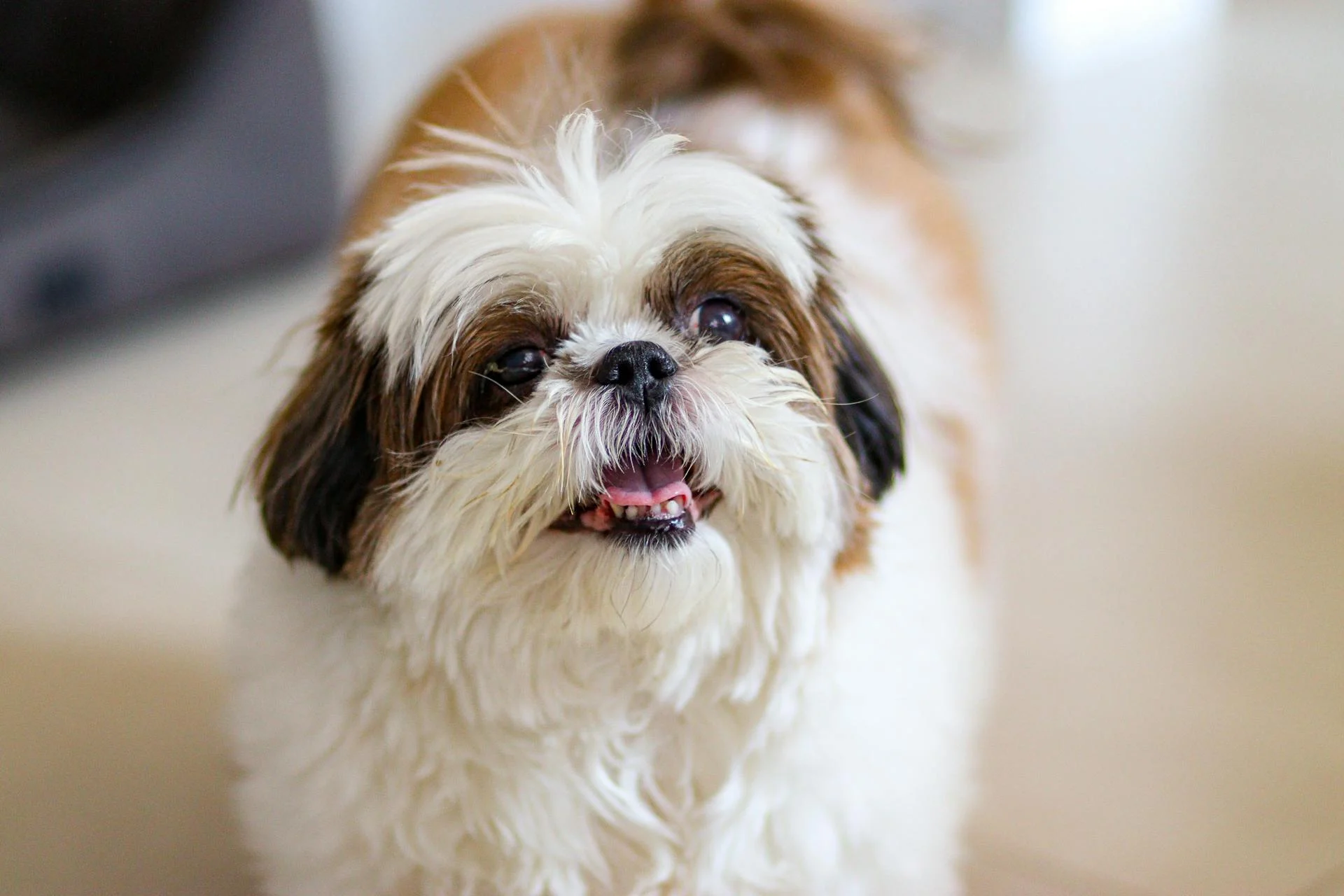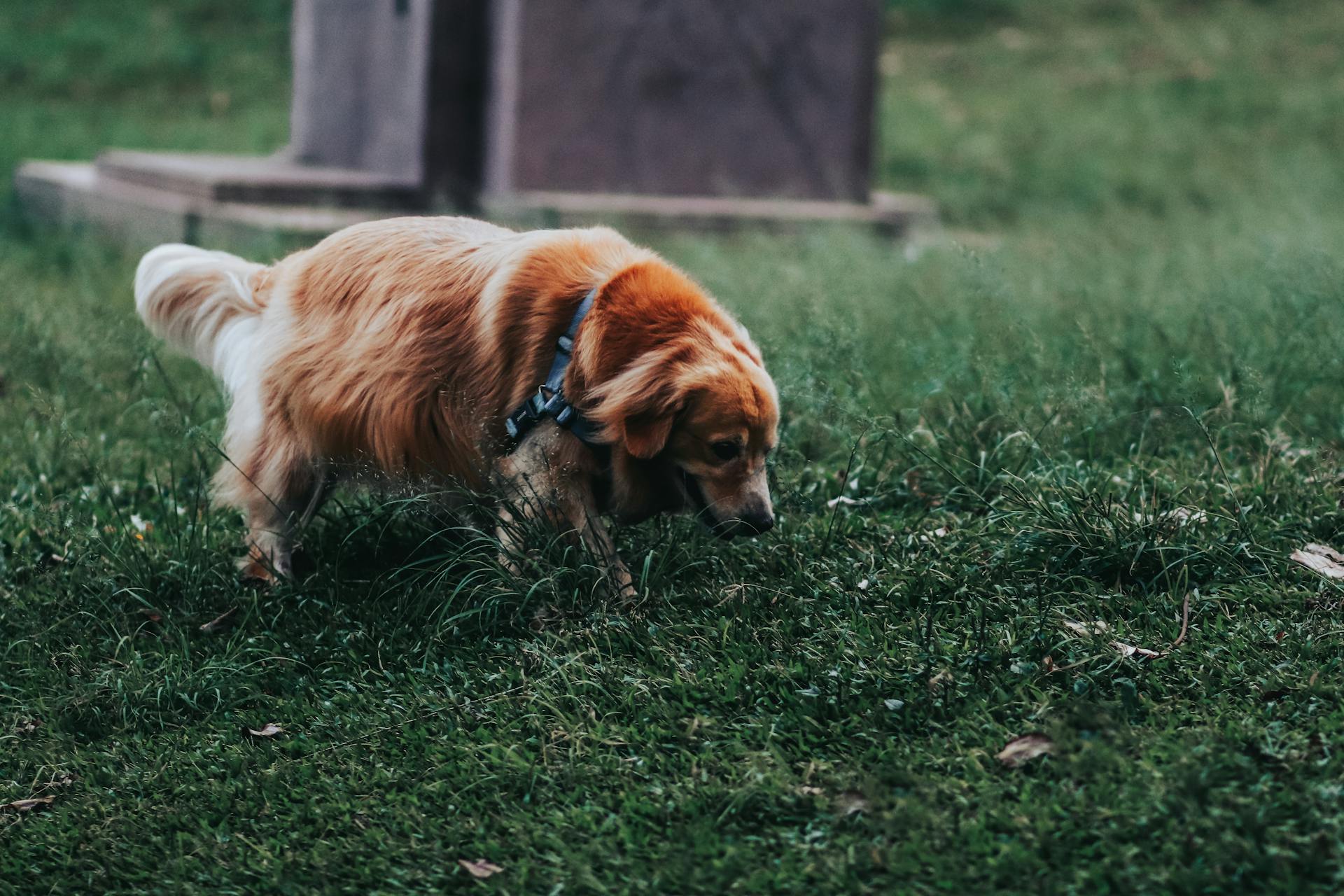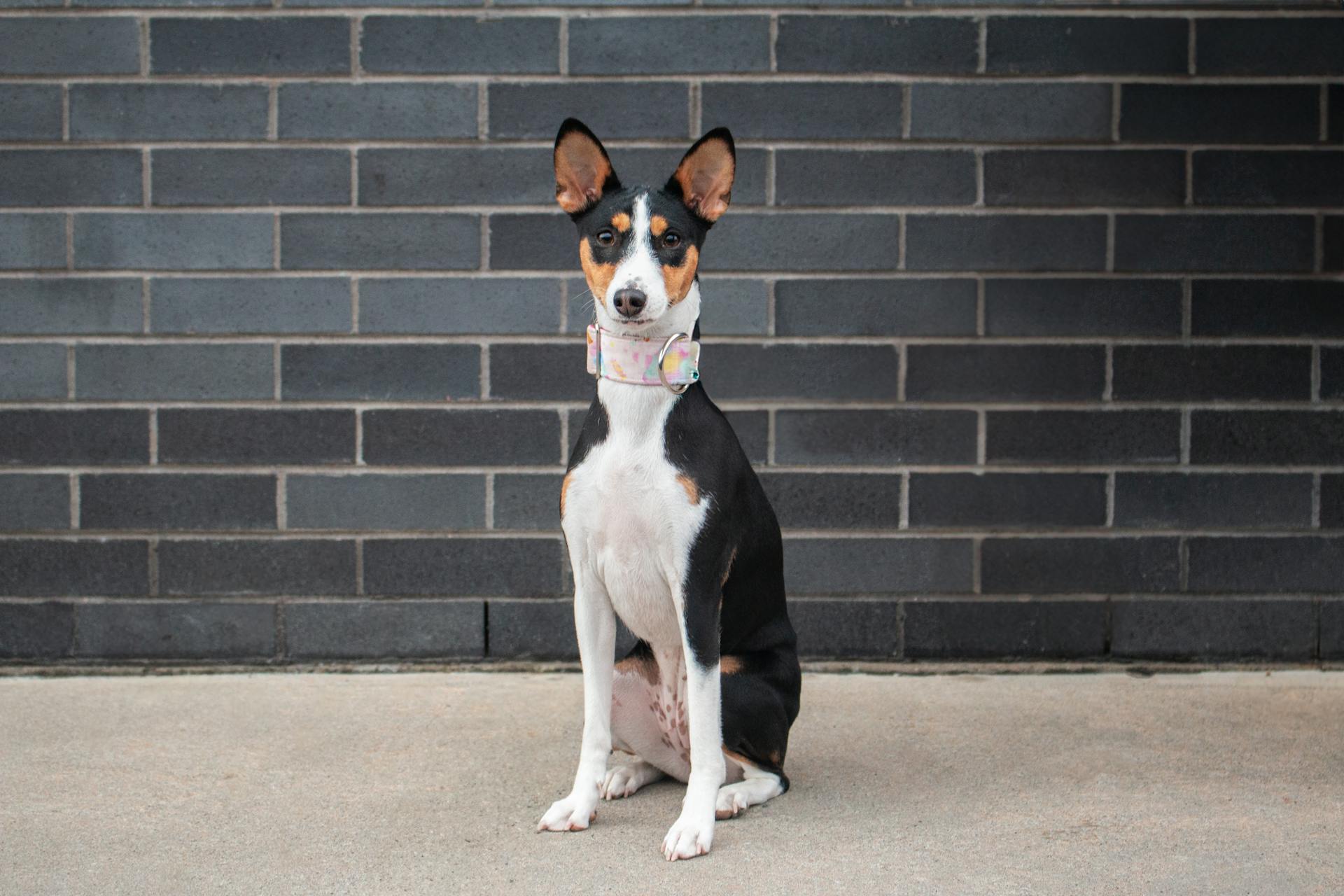
Shih Tzus are known for their loyal and affectionate nature, often forming strong bonds with their owners.
They require regular grooming to prevent matting and tangling of their long coats.
Shih Tzus can be prone to barking, especially if they're not receiving enough physical or mental stimulation.
A daily walk and playtime can help reduce barking and keep them happy.
Establish a Routine
Establishing a routine is essential for a happy and well-adjusted Shih Tzu. A regular routine helps to prevent boredom and destructive behavior.
Providing opportunities for socialization is crucial, as dogs that are isolated too often are prone to being fearful of others. This can lead to anxiety and aggression issues down the line.
A consistent daily schedule helps to create a sense of security and predictability for your Shih Tzu. This can include regular feeding times, exercise, and playtime.
Training and Exercise
Training a Shih Tzu can be a joy, as they're smart, fun-loving, and eager to please.
Their alert nature makes them great at barking to signal someone's approach, but they're also happy to be lap dogs, which means they love being around their human family.
To start training, it's best to begin at 8 weeks old, as Shih Tzus can have a stubborn streak.
Training sessions should be short, around 5-10 minutes, to keep your pup engaged.
Shih Tzus are prone to separation anxiety, so it's essential to socialize them properly to avoid possessiveness.
They love treats, but what they love more is their humans, so make sure to include plenty of quality time and interaction in their training.
A daily walk of around 30 minutes, split into two walks with playtime in between, is a great exercise routine for adult Shih Tzus.
As a flat-faced breed, they need plenty of chances to rest and cool down, especially in warmer temperatures.
Here are some fun activities to keep your Shih Tzu entertained:
- Hide and seek is a great game, as finding you is the reward!
- A 'lucky dip' is another fun way to keep your Shih Tzu engaged, fill a large box with mundane filler items and hide their toys at the bottom.
Remember, consistency and praise are key to successful training, and patience is essential to overcome any challenges that may arise.
Personality and Temperament
Shih Tzus are known for their affectionate and playful nature, making them great companions for families with children and other animals. They thrive on human interaction and are happiest when they're by your side.
Shih Tzus can be a bit wary of strangers and prefer to get to know people on their own terms, which is why socialization is crucial, especially during puppyhood.
This breed tends to be adaptable and can adjust to a variety of lifestyles, from a sedentary lifestyle indoors to a more adventurous walk in the park. They just want to be with their people, no matter what.
Shih Tzus are generally comfortable with other dogs and pets, as long as introductions are careful. However, they don't tolerate rough play and can quickly make their feelings known, especially around small children.
Here are some key characteristics of Shih Tzu personality and temperament:
- Affectionate and playful
- Wary of strangers, but can get to know people on their own terms
- Adaptable to various lifestyles
- Generally comfortable with other dogs and pets
- Don't tolerate rough play
Shih Tzus have a big personality despite their small size, and they make loyal and loving companions for families.
Health and Care
Shih Tzus are generally happy and sociable dogs that don't like to spend time alone.
They require regular socialization to avoid anxiety, which can lead to behaviors like excessive barking or digging.
Their exercise needs are relatively low, satisfied with a 30-minute walk and at-home playtime.
Shih Tzus are quick to learn new tricks, but they do love to be spoiled with attention and treats.
Their long, luxurious double haircoat grows continuously and requires regular grooming to prevent tangling and matting.
If left uncut, their fur can grow so long that it drags on the ground, making regular brushing and bathing a weekly chore.
Additional reading: How Long Should a Dog Chew on a Bully Stick
Brachycephalic Syndrome
Dogs with flat faces, such as the Shih Tzu, are prone to brachycephalic syndrome. This condition can cause trouble breathing and make them more susceptible to overheating.
Small nostrils are a common feature of brachycephalic syndrome, making it harder for dogs to breathe. A long, soft palate can also get in the way, causing breathing difficulties.
A collapsing trachea can further exacerbate the issue, making it even harder for dogs to get the air they need. Extra tissue in the back of the throat can also cause problems.
Surgery may be an option for severe cases, often discussed with veterinarians when the dog is still a puppy.
Luxating Patellas
Luxating patellas is a condition where the kneecap slips out of its normal position, causing discomfort, limping, and arthritis.
Dogs with luxating patellas will occasionally skip and hold up a back leg during walking, a common behavior that's a dead giveaway for this issue.
The patella may return to its normal position on its own, but in severe cases, surgery is often recommended to prevent further complications.
In some cases, the kneecap may slip back into place, but repeated instances can lead to arthritis and chronic pain for the dog.
For another approach, see: Dogs Back Legs Crossing When Walking
Eye Care
Taking care of your Shih Tzu's eyes is crucial to prevent irritation and staining. They can easily become inflamed if their facial hair rubs against their eyes.

Their prominent eyes make them prone to tear staining due to excessive tear production or blocked tear ducts. This leads to a reddish-brown pigment buildup at the inner corners of the eyes.
Keeping this area clean and dry is essential to avoid staining. Regular grooming and cleaning can help prevent tear staining.
If your dog's eyes are red, swollen, or painful, it's essential to contact your veterinarian for proper care.
Pet Care
Socialization is key for Shih Tzu puppies to avoid anxiety and bad behaviors like excessive barking or digging. They need to interact with people and other animals from an early age to develop good habits.
Exercise is essential for all dogs, but Shih Tzus are generally satisfied with a 30-minute walk and some at-home playtime. They love to please their owners and are quick to learn new tricks.
Their long, luxurious double haircoat requires regular upkeep, and it's prone to tangling and matting. Brushing and bathing will be a weekly chore if you don't keep their coat short.
Shih Tzus are brachycephalic, meaning they have a short, squished muzzle that can put them at risk for overheating or heatstroke. They need to stay out of the hot summer weather to stay safe.
Understanding Shih Tzu Behavior
Shih Tzus are intelligent and eager to please, which makes them relatively easy to train. They respond well to positive reinforcement and reward-based training methods.
Shih Tzus are prone to separation anxiety and don't like to be alone for extended periods of time. They need companionship to thrive and can become destructive if left unsupervised for too long.
To prevent unwanted behaviors, provide your Shih Tzu with plenty of mental enrichment. Daily training for obedience and tricks, as well as providing puzzles or interactive toys, can keep their mind engaged and prevent destructive chewing.
Here are some fun activities to do with your Shih Tzu:
- Neighborhood walks
- Backyard or indoor playtime
- Learning tricks
- Cuddling with family
Remember, consistency and praise are key when training your Shih Tzu. With patience and positive reinforcement, you can help your Shih Tzu become a well-behaved and loving companion.
Mental Enrichment Needs
Shih Tzus need lots of mental enrichment to keep their minds engaged and prevent unwanted puppy behaviors like destructive chewing. Daily training for obedience and tricks is a great way to provide enrichment and keep their brain sharp.
Shih Tzus love to learn, but they can be strong-willed, so it's essential to start training from 8 weeks old. This breed has a stubborn streak, so don't delay training, thinking they're too cute to train.
To keep your pup engaged, keep training sessions short – around five to ten minutes – to stop them getting bored. A combination of short walks and games will help expel excess energy and avoid unwanted behaviors.
Shih Tzus love treats, but they love their humans more! Proper socialisation will help to avoid any possessiveness the breed is known for. They can be prone to separation anxiety, so should only be left alone for short periods of time.
Here are some fun activities to provide mental enrichment for your Shih Tzu:
- Hide and seek is the perfect game to play with your Shih Tzu because finding you is the reward!
- A 'lucky dip' is another great way to keep your Shih Tzu entertained. Fill a large box with mundane filler items, like old toilet roll tubes or newspaper, and hide their toys at the bottom. Your dog will love rifling through the box to find buried treasure.
Remember, mental enrichment is just as important as physical exercise for your Shih Tzu's overall well-being. By providing plenty of mental stimulation, you'll help prevent unwanted behaviors and strengthen your bond with your furry friend.
Behavior and Training
Shih Tzus are intelligent and eager to please, which makes them relatively easy to train. They respond well to positive reinforcement and reward-based training methods.
Shih Tzus need mental enrichment to keep their minds engaged and prevent unwanted behaviors. Daily training for obedience and tricks is a great way to provide enrichment and keep their brain sharp.
Shih Tzus can be strong-willed, so it's best to start training from 8 weeks old. Keep training sessions short, around five to ten minutes, to prevent boredom.
Shih Tzus love treats, but they love their humans even more. Proper socialization will help avoid possessiveness in this breed.
To avoid unwanted behaviors, Shih Tzus need regular exercise and mental stimulation. A daily routine of short walks, playtime, and training will keep them happy and well-behaved.
Here are some fun activities to do with your Shih Tzu:
- Neighborhood walks
- Backyard or indoor playtime
- Learning tricks
- Cuddling with family
Shih Tzus are people pleasers, so they respond well to positive reinforcement and reward-based training. However, consistency and patience are key to successful training.
Shih Tzus can be prone to separation anxiety, so it's essential to establish a routine and provide plenty of attention and exercise. With proper training and care, Shih Tzus make wonderful companions.
Expand your knowledge: Dog Training Stop Biting
Alone: Tolerable?
Shih Tzus don't like to be alone for extended times. They are very social animals and need companionship to thrive.
They can tolerate short periods alone, but not for long amounts of time. This is when they can suffer from separation anxiety.
To help your Shih Tzu tolerate time alone, set up a routine that includes attention and play time before leaving your home. This will help them feel secure and content while you're away.
Make sure they have plenty of food, water, and toys to keep them occupied. This will help distract them from your absence and make the time pass more quickly.
Training your Shih Tzu to be alone is key to a happy and healthy life for both you and your dog.
History and Temperament
The Shih Tzu is a breed with a rich history that dates back over 1,000 years, originating in Tibet and later becoming a beloved companion animal in China and across Asia.
Shih Tzus are known for their affectionate and playful personalities, making them ideal companions for owners who can spend quality time with them.
As a breed that thrives on human company, Shih Tzus are happiest when they're at your feet or side, which is why they're best suited for owners who can be home most of the time.
However, Shih Tzus can be wary of strangers and prefer getting to know people on their own terms, requiring lots of socialization as puppies.
They're usually comfortable with other dogs and pets, as long as introductions are careful, but may not tolerate rough play with small children.
Here's a quick rundown of the Shih Tzu's temperament:
Despite their long history, the Shih Tzu's temperament is not set in stone, and individual dogs can have unique personalities.
Shih Tzu Compatibility and Suitability
Shih Tzus are great with children, but it's essential to teach small kids how to interact with them gently, as Shih Tzus can be sensitive.
Their playful energy level, eagerness to please, and adaptability make them ideal pets for households with kids. However, every pup is different, so it's crucial to observe your Shih Tzu's comfort level around young children.
Having your child help with the basic training process of your Shih Tzu can be beneficial for both your pet and your child, teaching them how to function together harmoniously.
Choosing the right home for your Shih Tzu is vital, and apartment living can be a great option if you provide enough exercise and play accommodations.
Shih Tzu Care and Ownership
Shih Tzus are social animals that thrive on attention and interaction, so they shouldn't be left alone for extended periods.
To avoid anxiety and bad behaviors, Shih Tzu puppies need to be socialized at a young age.
They require regular exercise, but a 30-minute walk and some at-home playtime is usually sufficient.
Shih Tzus love treats and praise, and they're quick to learn new tricks to get them.
Their long, luxurious coat grows continuously and needs regular grooming to prevent matting and tangling.
Shaving their coat into a "puppy cut" can make grooming easier, but it's a good idea to brush and bathe them weekly if you want to keep their coat longer.
Brachycephalic breeds like Shih Tzus are at risk for overheating and heatstroke, so they should be kept out of the hot summer sun.
See what others are reading: Groomed Shih Tzu
What to Know Before Getting a Shih Tzu
Getting a Shih Tzu can be a great decision, but it's essential to consider their needs and temperament before bringing one home. They're bred to be companions, so they thrive on human interaction and love spending time with their family.
Shih Tzus are generally great with children and other animals, making them a wonderful addition to families with kids or multiple pets. However, they can be challenging to train due to their independent streak, so be realistic about how much time you have for training.
Additional reading: Great Pyrenees Dog Aggression
To ensure you're getting a healthy Shih Tzu, choose a licensed and reputable breeder. 'Lucy's Law' dictates that new puppies or kittens must be bought directly from a breeder or adopted from rescue, not from third-party sellers.
Shih Tzus are prone to health conditions, just like any other dog, so look carefully at the veterinary cover provided when shopping around for pet insurance. Not all policies are the same, so make sure you understand what's included.
Here are some key things to consider before getting a Shih Tzu:
- Training time: Be prepared to invest time and patience in training your Shih Tzu, especially if you're an adult.
- Health: Shih Tzus can suffer from health conditions, so research pet insurance carefully.
- Breeder: Choose a licensed and reputable breeder to ensure you're getting a healthy puppy.
- Exercise: Shih Tzus need regular exercise, but a 30-minute walk and at-home playtime should suffice.
Remember, Shih Tzus are social animals and don't like to spend time alone, so make sure you can provide them with plenty of attention and interaction. With the right care and attention, a Shih Tzu can be a loving and loyal companion.
Sources
Featured Images: pexels.com


